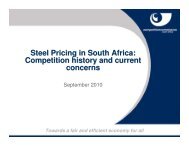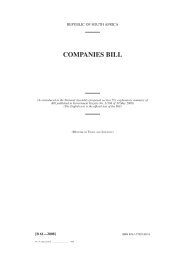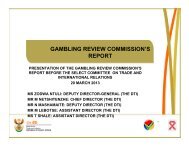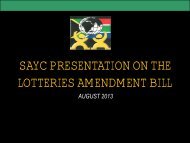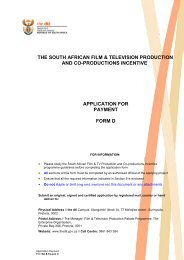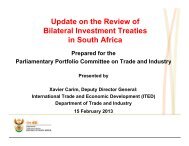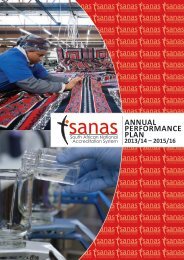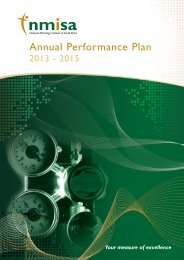Copyright Review Commission Report - ICT Law and Regulation ...
Copyright Review Commission Report - ICT Law and Regulation ...
Copyright Review Commission Report - ICT Law and Regulation ...
- No tags were found...
You also want an ePaper? Increase the reach of your titles
YUMPU automatically turns print PDFs into web optimized ePapers that Google loves.
10.12.2. The <strong>Regulation</strong>s should recommend the appropriate period for retention of unclaimed royalties. It isrecommended that the minimum retention period be five years <strong>and</strong> any unclaimed royalties older than thatshould only be used for social-related activities <strong>and</strong> cultural projects that will benefit local artists.10.12.3. As part of the annual returns submitted to the Registrar, all collecting societies within the ambit of his or herjurisdiction should report the total <strong>and</strong> individual amounts paid to foreign entities via foreign collecting societiesor through the agencies of the foreign publishing houses, as well as the individual amounts collected from theforeign sources.10.12.4. The legislation to be amended as follows: retention of music usage information to be compulsory for essentialmusic users <strong>and</strong>, where the music usage information is not retained by the background music users,appropriate statistical sampling techniques to be used by the collecting societies to determine the appropriatesplit of the distributions.10.12.5. The dti should develop a st<strong>and</strong>ardised template for contracts between performers <strong>and</strong> recording companiesthat will deal with all the above-mentioned loopholes <strong>and</strong> should encourage performers <strong>and</strong> recordingcompanies to use this contract.10.12.6. Each year, for at least five consecutive periods, the dti should initiate <strong>and</strong> fund an audit on behalf of at least 10r<strong>and</strong>omly selected artists. This audit should examine all financial transactions processed via recording entitiesfor the selected artists. The outcome of such audits should be reviewed by both the dti <strong>and</strong> the respectiveartists to ascertain the trends <strong>and</strong> the level of integrity among recording entities..10.12.7. SAMRO’s practice of distributing unallocated revenues is unacceptable. Thorough <strong>and</strong> effective means oftracing those persons entitled to royalties should be introduced, providing inter alia, for details of missing rightsowners to be published on the Internet, in newspaper advertisements <strong>and</strong> newsletters to members of SAMRO. .10.12.8. SAMRO should seek a m<strong>and</strong>ate from its members (via a Special Resolution) for the utilisation of cashresources for investment purposes.10.12.9. Notwithst<strong>and</strong>ing the fact that South Africa is a member of the World Trade Organisation (WTO) <strong>and</strong> affordsnational treatment to foreign copyright works, an exception has been created in respect of sound recordings.Sound recordings made in foreign countries will only enjoy copyright protection in South Africa to the extent thatthe sound recording enjoys the same protection in that country of origin (see General Notice No. 136 of 1989GG No. 11717 of 3 March 1989). Similarly, Section 4 of the Performers’ Protection Act provides thatperformances of foreign origin shall only enjoy needletime rights if corresponding protection is conferred onSouth African performances in that country. Consequently, sound recordings that were made in countries suchas the USA, which do not recognise needletime rights, will not be granted that right in South Africa. Theseperformers <strong>and</strong> producers of sound recording should not be compensated for the use of their works by the radiostations <strong>and</strong> other public users. In line with the legal principles set out above, the CRC recommends nonpaymentfor needletime rights where sound recordings from countries that do not recognise such rights werebroadcast, played or communicated to the public.10.12.10. A significant amount of royalty distributions does not accrue to the relevant artists due to the fact that theirrights were assigned to third parties. These assignments normally arise as a result of disparate circumstances- 80 -




